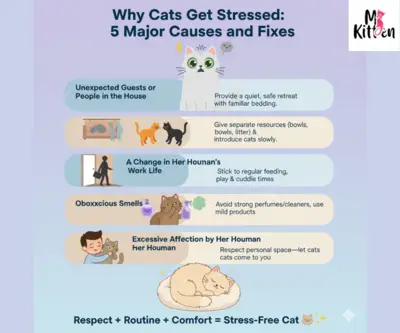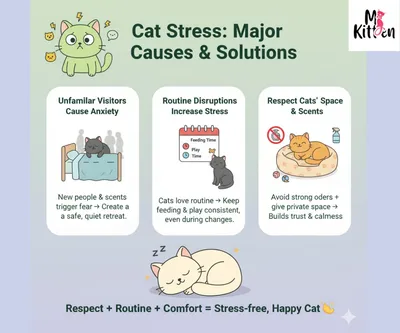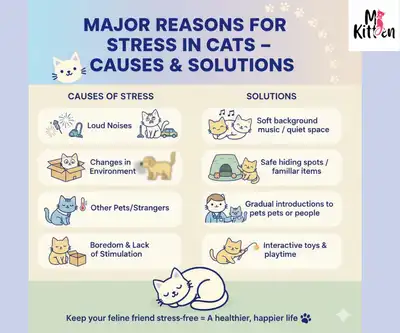Major Reasons for Stress in Cats: Causes & Solutions
Recognizing and Managing Stress in Cats: A Comprehensive Guide
Did you know that nearly 30% of cats exhibit signs of stress, impacting their overall well-being? Feline stress can stem from various sources, including unexpected guests, conflicts between cats, changes in an owner’s work life, obnoxious smells, and even excessive affection.
Recognizing the major reasons of stress in cats is crucial for cat owners to provide a comfortable and healthy environment.
Cat stress, or feline stress, can manifest in different ways, from behavioral changes to health issues.
By understanding the causes of cat stress, owners can take proactive steps to mitigate its effects, ensuring their pets lead happier, healthier lives.
Is Your Cat Stressed? Understanding the Signs and Solutions
Understanding Cat Stress and Its Impact
Feline stress is a growing concern among cat owners, manifesting in anxiety and behavior problems. Cats under stress can exhibit a range of symptoms, including changes in appetite, hiding, or aggressive behavior.
Reducing cat stress is essential to prevent these issues and ensure the overall well-being of your feline companion. Stress can stem from various sources, including changes in the environment, introduction of new pets or people, or even certain medical conditions.
Creating a calm environment is crucial in mitigating cat anxiety and behavior problems. This can be achieved by maintaining a consistent routine, providing a quiet and safe space, and minimizing changes in your cat’s surroundings.
By understanding the causes of stress in cats and taking steps to reduce it, cat owners can significantly improve their pet’s quality of life, leading to a happier and healthier feline companion.

Major Reasons of Stress in Cats, With Causes and Solutions
Several factors contribute to stress in cats, affecting their quality of life. Understanding these causes is crucial for cat owners to provide a more comfortable and calming environment for their pets.
Why Unfamiliar Visitors Trigger Anxiety in Cats
Cats are territorial animals and often feel threatened by unfamiliar visitors. This can lead to stress and anxiety, manifesting in various behaviors such as hiding or aggression.
Unfamiliar visitors can trigger anxiety in cats due to the sudden change in their environment and the introduction of new scents and sounds.
To mitigate the stress caused by visitors, it’s essential to create a safe space for your cat. This can be a quiet room where your cat can retreat when feeling overwhelmed.
Ensure this space is comfortable and familiar, with your cat’s favorite bedding and toys.
Territorial Disputes and Hierarchy Issues
In multi-cat households, territorial disputes can arise, leading to stress among cats. Establishing a clear hierarchy or providing separate resources can help alleviate this issue.
Monitoring your cats’ behavior and intervening when necessary can prevent conflicts.
Effective Techniques for Cat Introduction and Mediation
When introducing new cats to each other, it’s crucial to do so gradually. Start by keeping them separated and allowing them to become familiar with each other’s scents and sounds.
Gradually increase their interaction under close supervision to prevent conflicts.
How Schedule Disruptions Affect Your Cat’s Wellbeing
Cats thrive on routine, and disruptions to their schedule can cause stress. Changes in work patterns or travel can affect your cat’s feeding times, playtime, and overall routine.
Maintaining as much consistency as possible can help minimize the impact of schedule disruptions.
Maintaining Routine During Life Transitions
During significant life changes such as moving house or having new family members, maintaining your cat’s routine can provide a sense of stability.
Stick to regular feeding times, play, and sleep schedules to comfort your cat during these transitions.
Why Certain Odors Distress Your Cat
Cats have a sensitive sense of smell, and certain odors can be distressing for them. Strong perfumes, cleaning products, or new furniture can cause discomfort.
Being mindful of the scents in your home and minimizing strong odors can help create a more comfortable environment for your cat.
Creating a Scent-Friendly Home Environment
To create a scent-friendly environment, opt for mild cleaning products and avoid strong fragrances. You can also provide your cat with familiar scents, such as their bedding or favorite toys.
This can help in reducing stress caused by unfamiliar or unpleasant odors.
Understanding Your Cat’s Personal Space Needs
Respecting your cat’s personal space is vital for their emotional wellbeing. Allow them to have areas where they can be alone and undisturbed.
Recognizing and respecting these boundaries can help build trust and reduce stress.
Building Trust Through Respectful Interaction
Interacting with your cat in a respectful and gentle manner can help build trust. Avoid sudden movements or loud noises, which can startle your cat.
By being mindful of your cat’s comfort and personal space, you can foster a more trusting and less stressful relationship.

5 Major Reasons of Stress in Cats, With Causes and Solutions
We all know that our feline friends are super sensitive creatures who can easily get troubled by witnessing the slightest of change around them, that we humans might not be able to notice at times but such stress and anxiety can indeed have grave debilitating effects on our kitty’s health, and this can thereby lead to several varied and noticeable behavioural changes such as avoiding the litter box, spraying around, and against the walls or furniture in order to mark her territory, sudden aggressive behaviour, hissing and scratching her hooman, depression, and complete withdrawal, or even sudden exacerbation in any existing health ailment. A cat may also lose her appetite and behave in a very different way, something that her hooman companion might have not seen before, as just like us humans, our feline friends can also get disturbed and hence have emotional, mental and physical ailments by virtue of any sudden change, that is most likely stressing out our feline furball.
Mentioned below are a list of five different causes that stress out our feline companions, and also we have elucidated the possible to do solutions for any such unsolicited stress that might be bothering your bundle of joy.
1. Unexpected Guests or People in the House –
It is a misconception that cats are not as loving and loyal as dogs are, because your feline companion would greatly get stressed if there’s any sudden change in her inner hooman circle, that thereby includes the loss of her hooman due to death, sudden separation or her hooman parent leaving her and moving out of the house. Also when new people, especially guests and other visitors pay you a visit you, your shy and introvert kitty might get stressed and she would suddenly freak out seeing alien hoomans around herself, with her own hooman paying more of attention to them, your kitty might even feel envious seeing this. Older parents moving in, you getting married or having a baby, or even a new maid servant can also easily trouble and stress out your feline companion. According to a review in the Scientific World Journal, a single visit from a stranger was alone considered as the most common source of stress for cats.
• Solution to fix this – Give your kitty a lot of time and show some perseverance while introducing your furball to new people. Make your kitty interact with new people during fun play sessions, and offer her loads of treats and sweet belly rubs so that she is able to acclimatize with the new person, however also make sure to have a quiet and a safe place for your kitty to retire to, in case she feels threatened or intimidated around a new guest or family member.
2. Conflicts Between Cats –
Any unsolicited conflict between cats is indeed one of the greatest sources of stress and anguish for your feline companion. This is usually the case in a multiple – cat household and those aggressive howls with the ugly inter- cat physical confrontations must be avoided at all times. Cat’s usually get into such nasty and daunting fights in case they have to share their essential needs such as their food bowl and litter box. A study found out that around a quarter of cats don’t have their own food bowls and also more than half of these cats had to unfortunately share their litter boxes with the other household cats, and hence such cats undoubtedly fight over resources, but as a responsible cat
parent, we must always make sure to evade such fights and to quickly disperse the cats in such case.
• Solution to fix this – Always make sure to keep sufficient number of litter boxes, and as a rule of thumb, it is imperative to have one extra litter box as compared to the number of cats. For example – In case you have two cats, you must keep three litter boxes for your two kitties. Also make sure to separately feed your kitties, and give sufficient and equal amount of love and attention to each of your kitty as this helps calm them down and keeps all their stress and anxiety at bay.
3. A Change in her Hooman’s Work Life –
Your cat might get terribly nervous and would exhibit a sudden inclination to isolate herself and remain aloof in case your new job or your professional work life and erratic schedule makes you come back home late at night and if you are giving less of time to your majestic queen cat. The cause behind this is no rocket science, it’s plain simple and that is your kitty likes a normal schedule, and any abrupt changes in her hooman’s life or his work schedule can indeed take a toll on not only your health, but also your kitty’s health.
• Solution to fix this – Primarily, you must spend a lot of time with your cat. Invest quality time with your kitty and make her gradually transit and acclimatize with your new work schedule. Make sure to keep the initial transition process really slow, and also keep sufficient food, water and clean litter for her when you are away. Furthermore once you return back home, you must not simply go into bed, but rather indulge in some sweet playtime with your feline munchkin and make her feel loved.
4. Obnoxious Smells –
The sweet and pleasant smell of our favorite eau de parfum or eau de toilette might actually be extremely awful and obnoxious for our kitty who being mute, is unable to express it to us, but our feline companions have a very sharp and strong sense of smell and any such new odour might be thoroughly unpleasant for your kitty. This can indeed be another major cause of unexpectedly triggering stress for your furball.
• Solution to fix this – Consider using non- scented detergents and candles, also wear mildly scented perfumes and make sure to always avoid citrus scents as our feline friends in particular abhor certain smells, the citrus scent being one such pungent smell.
5. Excessive Affection by her Hooman –
Yes you read that right! Too much of affection can indeed stress out our kitty and we as loving parents can sometimes unknowingly become a source of stress for our charming little munchkin. It is sad but cat parents often try to squeeze and nuzzle their feline companion and such forceful petting is a complete no no, especially when dealing with cats, as our feline friends don’t like being squeezed at all, and this might inadvertently trigger stress for our cats.
• Solution to fix this – Please learn how to love your supremely delicate and sensitive bundle of joy as harsh petting is absolutely not advisable for cats. We must handle our feline furballs with great care and soft, light strokes along with some cuddles are ideal for them. Massaging and light scratch-like movements are also particularly enjoyable for your cat companion, and some kitties would be even content and satisfied with tender ear scratches. Hence please make sure to love your kitty in a way that makes her feel comfortable and not agitated. There are a plethora of ways via which we can demonstrate our love for our feline companion such as playing with her, and giving her regular treats instead of forcefully smothering her with our excessive love, that for her, might be toxic.


Conclusion: Fostering a Calm and Happy Feline Companion
Understanding and addressing feline stress is crucial for creating a harmonious home environment. Cat anxiety can manifest in various ways, and recognizing the signs is the first step towards providing a calm and happy life for your feline companion.
By implementing calming solutions for cats, such as reducing environmental stressors and providing a nurturing atmosphere, cat owners can significantly improve their pet’s well-being. Simple changes, like creating a quiet space or using pheromone therapy, can make a significant difference in reducing feline stress.
By taking proactive steps to minimize cat anxiety, you can strengthen the bond with your pet and ensure they lead a happy, stress-free life. A calm environment not only benefits your cat but also enhances your overall relationship, leading to a more fulfilling companionship.


